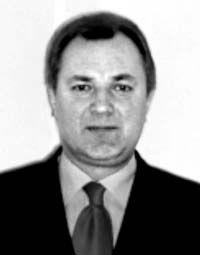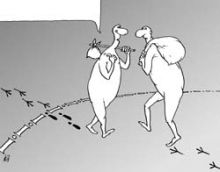Various sources point to some 90% Ukrainians currently working in Russia as illegal immigrants, meaning they are not officially registered, pay no taxes, and that these people can hardly expect old-age pensions or anyone to defend their civil rights — even if some of them are paying into Russia’s pension fund, for Russia is not likely to pay them in return. At times, respectable Ukrainians become such illegal immigrants, failing to file for registration within the legally required three-day timeframe. Ivan KUKHTA, head of the Ukrainian consulate in Moscow, told The Day about how such problems are expected to be solved in Ukrainian-Russian relations.
The recent tragedies in Moscow are referred to as acts of terrorism. Are we to expect the Russian authorities to tighten the screws on the status of foreign nationals?
KUKHTA: We have no information about any such measures being taken by the Russian authorities. Such matters are regulated by bilateral Ukrainian-Russian agreements. There are talks underway to upgrade such agreements, aimed at softening, rather the toughening the status of Ukrainians currently in Russia. I think that an agreement providing for simplified border-crossing and customs-clearance procedures will be signed this summer, making life easier for people residing in border areas.
Should we expect changes in the legal procedures relating to the registration of Ukrainians as foreigners in Russia?
KUKHTA: Under the current procedures, a foreigner must register with the competent Russian authorities within three days from his date of arrival. In practice, this clause is very difficult for the man in the street to carry out. Russians arriving in Ukraine have to get registered within ninety days — and they don’t have to do so if their stay is shorter than ninety days. During our talks we intend to correct this disproportion. By the way, people visiting Russia from Belarus can stay there as long as they want. We suggest that the Russian Federation extend the term of registration for Ukrainians for at least ninety days. Thus a kind of balance would be achieved.
How has the Russian side responded to the Ukrainian initiative?
KUKHTA: There are expert consultations underway and we can notice a positive attitude on the Russian side. I think that the matter can be resolved in Ukraine’s interests.
It is no great secret that a large number of Ukrainians are earning their living in Russia as illegal immigrants. Do you plan to solve this problem at the international level?
KUKHTA: Matters pertaining to the employment and social protection of Ukrainians are more complicated, but we are negotiating them nevertheless. Officially, 94,000 Ukrainian nationals received employment permits in Russia last year; Russian experts, however, point to some 800,000 Ukrainians working there. My unofficial sources read some million and a half Ukrainians (I wrote my MA thesis on the subject and had studied the problem in depth). Ukrainians seek jobs mostly in Moscow, in Moscow and Tiumen oblasts, as well as in south Russia, where most Ukrainians are hired as seasonal workers. We understand the Russian government’s position; we agree that this sphere needs to be legalized. This can be accomplished only by signing new agreements, as the current ones are no longer relevant. There is an agreement on temporary employment in the CIS states, but times are changing. There are no legal clauses on how Ukrainians can make payments to the Russian pension fund, how they can receive medical aid, and many other things. A draft agreement on Ukrainian employment and social protection in Russia is being actively elaborated at the labor ministries in both countries. It’s a very complicated issue, so it’s too early to predict the outcome. Here one is confronted with economic problems in the first place. Ukraine, however, has such an agreement with Portugal and others are being drafted, involving Italy, France, and other countries. After signing such an agreement, officials on both sides find it easier to solve issues such as granting work permits, and illegal employment will no longer be a pressing issue.
How would this employment agreement help Ukrainians illegally working in Russia?
KUKHTA: This agreement, if and when signed, will contain clearly defined employment quotas relating to various industries in need of such manpower. The interested ministries will study them and submit the relevant information. Such quotas will be allocated for all regions, so that, say, the governor of Krasnoyarsk will be prepared to accommodate 200,000 Ukrainian laborers, meaning that he will also assume full responsibility for their social protection. In Moscow, this issue has been settled in the transport domain. The Moscow Transport Department is happy to employ Ukrainians as trolley drivers — mostly people from Luhansk, Donetsk, Kharkiv, and Chernihiv oblasts. Now you can seldom find a streetcar or trolley driver in Moscow who actually comes from Russia. They are paid $500 a month, something nobody acting in the same capacity can earn in Ukraine. True, their working conditions are hard, sometimes they have to work 18-20 hours per shift. But they return home with enough money to buy an apartment in their respective district centers. By the way, we are negotiating the establishment of a Russian migration office in Kyiv, in order that our citizens could get Russian work permits there, so people could receive six-month employment cards in Kyiv and then go to Russia and work there unmolested by the authorities.








